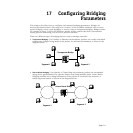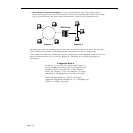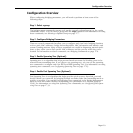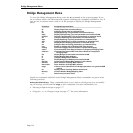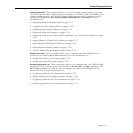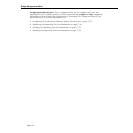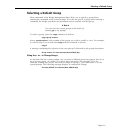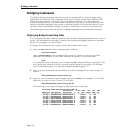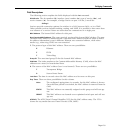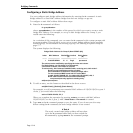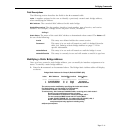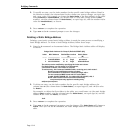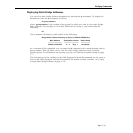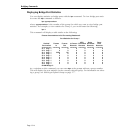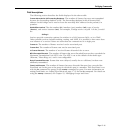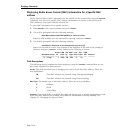
Bridging Commands
Page 17-9
Field Descriptions
The following section explains the fields displayed with the fwt command.
Sl/In/Srvc/In. The slot number (Sl), interface (port) number (In), type of service (Src), and
service instance (In). For example, a bridge service on port 1 of slot 3 would be:
3/1/Brg/1
Services provide connection options for switches in a LAN, between LANs, or in a WAN.
Other possible services include trunking, routing, and LANE. It is possible to have more than
one instance of a service if there are more than one connections on a single port.
MAC Address. The learned MAC address for this port.
Non-Canonical MAC address. The non-canonical version of the learned MAC address. The non-
canonical MAC address is different from a canonical MAC address in that the order in which
the address information is sent is different. Ethernet uses canonical address, while other
media (e.g., token ring, FDDI) use non-canonical.
T. The protocol type of this MAC address. There are two possibilities:
E Ethernet
F FDDI
T Token Ring
Group ID. The associated group ID for this learned MAC address.
CAM Indx. The index number to the Content-Addressable Memory (CAM), where the MAC
addresses are stored, in hexadecimal form.
S. The source of the MAC address (how it was learned). There are two possibilities:
T Transparent Bridge
S Source Route Frame.
Last Seen. The time in seconds since this MAC address was last seen on this port.
Exp. Timer. There are three possibilities for this column:
Value The configured ageing timer, in seconds, for this MAC address is shown.
Once this time period is exceeded, the MAC address is removed from the
CAM.
STATIC This MAC address was manually assigned to this group and will not age
out.
OPSWT This MAC address was learned on an optimized switch port and will not
age out.
ATM VCI. The ATM Virtual Channel Identifier (VCI) for this MAC address entry. The VCI is
shown for any media that uses Virtual Circuits (ATM, LANE).



